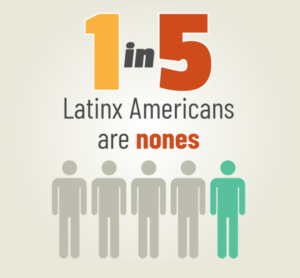Latinx Nonreligious Americans on the Rise

This article originally appeared in the Chicago Tribune on October 5, 2021.
Amid increased calls for diversity and representation, the reality continues to be that the media leans heavily on stereotypes and tropes, making necessary a serious focus on the lack of intersectionality. Take into account some examples from pop culture. Jane the Virgin, a popular TV series first aired on the CW, was praised for its predominantly Latinx cast, however, its strong Catholic influences (which include the title of the show itself) present issues for its ability to truly represent the whole community.
Unfortunately, the Latinx community is often portrayed in the media as a religious monolith, typecast into a Catholic narrative. Although Catholicism has played a cultural and historic role in many of those communities, it doesn’t accurately depict the diverse nature of the Latinx religious landscape. Not all Latinx people are Catholic or even religious. It’s time the media made an effort to acknowledge and celebrate the different identities of Latinx people, including the nonreligious. Nonreligious Latinx people do not want to be treated as statistical oddities, but as a growing community of humanists, atheists, and freethinkers. According to a recent Pew Research Center 2014 Religious Landscape Survey, one in five Latinx people do not identify with any religion.
Anthony Cruz Pantojas is the co-chair of the Latinx Humanist Alliance (LHA) (an affiliate of the American Humanist Association), the Humanist Chaplain at Tufts University, and a well-known leader within the secular movement. Cruz’s journey from a religious childhood to his work with interfaith and nonreligious communities is more common than you may think, especially within the Latinx community.
Cruz has always been inquisitive, especially when it comes to the topic of faith. Born and raised in Puerto Rico, Cruz had a Roman Catholic upbringing, attending services with the rest of his family. As he grew older, however, he knew he wanted to learn what else the world had to offer.
“Christian hegemony in Puerto Rico led me to explore what communities existed beyond its grasp.” He began to pursue an undergraduate degree in Social Studies and Anthropology, which he credits for his growing interest in other traditions and religions.
The reality is, the population of nonreligious Latinx Americans is increasing, having risen by 67% within less than a decade. There are now more than eight million nonreligious Latinx Americans. A portion of that population, 13% percent of Latinx Americans in general, identify as atheist or agnostic, which is almost double the number of Latinx adults who identify within a single non-Christian religion, such as Judaism, Buddhism, or Islam. The increase in “religious nones” within the Latinx community closely resembles the changing general American landscape, where nearly 23% of Americans are nonreligious.
While nonreligious Latinx people exist across all age groups, the population of nonreligious Latinx Americans skews rather young. This indicates that this community is here to stay, and will most likely grow in prominence in the years to come. Latinx adults between the ages of eighteen and twenty-nine make up only twenty percent of the Latinx Catholic community, while thirty-two percent of the same age group self-identify as nones. Many are also choosing to leave religious communities, with fifty-seven percent of nones having been raised Catholic and twenty-two percent as Protestant. Fourteen percent of the community grew up in nonreligious families, with more and more nonreligious Latinx parents choosing to raise nonreligious children. This trend is intergenerational, and further supports the growing prominence of the nonreligious Latinx community.
Every day, Cruz works to advocate for and raise awareness of the nonreligious Latinx community. “It is my deepest conviction that one of the ways to secure the future of humanism is through service, community, and mentorship,” he states, regarding why he decided to join the LHA, “The Latinx Humanist Alliance embodied the possibilities of these three pillars that define my humanist life stance while providing the space for me to continue to grow in these commitments on a daily basis.” The LHA came together to create a community for those with similar beliefs in humanism, that can also connect on a shared identity. Spaces like these do exist but are often not discussed within mainstream media.
Non-religious Latinx people are community organizers, students, business owners, and writers that seek out compassionate communities for their beliefs. Although there is growing awareness of the general increase in American nones, nonreligious communities of color are still often overlooked. The nonreligious community is still largely led and portrayed by an older White demographic, which doesn’t accurately represent the greater population. This Latinx Heritage Month, let’s work toward increasing awareness of nonreligious Latinx Americans, to provide a beacon for Latinx nonbelievers that feel isolated within religious communities.
